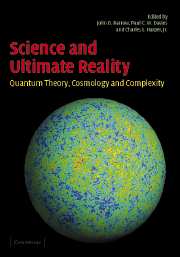Book contents
- Frontmatter
- Contents
- List of contributors
- Foreword
- Editors' preface
- Preface
- Acknowledgments
- Part I An overview of the contributions of John Archibald Wheeler
- Part II An historian's tribute to John Archibald Wheeler and scientific speculation through the ages
- Part III Quantum reality: theory
- Part IV Quantum reality: experiment
- Part V Big questions in cosmology
- 18 Cosmic inflation and the arrow of time
- 19 Cosmology and immutability
- 20 Inflation, quantum cosmology, and the anthropic principle
- 21 Parallel universes
- 22 Quantum theories of gravity: results and prospects
- 23 A genuinely evolving universe
- 24 Planck-scale models of the universe
- 25 Implications of additional spatial dimensions for questions in cosmology
- Part VI Emergence, life, and related topics
- Appendix A Science and Ultimate Reality Program Committees
- Appendix B Young Researchers Competition in honor of John Archibald Wheeler for physics graduate students, postdoctoral fellows, and young faculty
- Index
19 - Cosmology and immutability
from Part V - Big questions in cosmology
Published online by Cambridge University Press: 29 March 2011
- Frontmatter
- Contents
- List of contributors
- Foreword
- Editors' preface
- Preface
- Acknowledgments
- Part I An overview of the contributions of John Archibald Wheeler
- Part II An historian's tribute to John Archibald Wheeler and scientific speculation through the ages
- Part III Quantum reality: theory
- Part IV Quantum reality: experiment
- Part V Big questions in cosmology
- 18 Cosmic inflation and the arrow of time
- 19 Cosmology and immutability
- 20 Inflation, quantum cosmology, and the anthropic principle
- 21 Parallel universes
- 22 Quantum theories of gravity: results and prospects
- 23 A genuinely evolving universe
- 24 Planck-scale models of the universe
- 25 Implications of additional spatial dimensions for questions in cosmology
- Part VI Emergence, life, and related topics
- Appendix A Science and Ultimate Reality Program Committees
- Appendix B Young Researchers Competition in honor of John Archibald Wheeler for physics graduate students, postdoctoral fellows, and young faculty
- Index
Summary
If people do not believe that mathematics is simple, it is only because they do not believe how complicated life is.
John von NeumannThe ups and downs of oscillating universes
John Wheeler was one of the first to stress the physical significance of the fundamental Planck scales of mass, length, and time. He recognized their quantum gravitational significance and speculated upon the strange things that might happen when the universe crossed that mysterious threshold where general relativity and quantum theory meet to consummate their arranged marriage. For Wheeler, Einstein's conception of cosmology always implied a universe that was finite in size and total lifetime, a “closed” universe evolving from a Big Bang in the past to a Big Crunch in the future. We still do not know whether these two singular points of the evolution signal merely a breakdown of the nonquantum theory of gravity that we are using or whether they have special significance and will remain even in a future quantum theory of cosmology.
If our expanding universe of stars and galaxies did not appear spontaneously out of nothing at all, then from what might it have arisen? One option that has an ancient pedigree is to sidestep the question and propose that it had no beginning. It always existed.
- Type
- Chapter
- Information
- Science and Ultimate RealityQuantum Theory, Cosmology, and Complexity, pp. 402 - 425Publisher: Cambridge University PressPrint publication year: 2004
- 2
- Cited by



